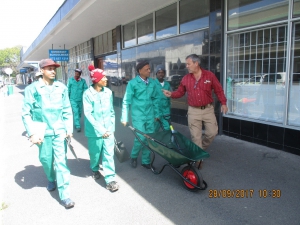The night shelter in Somerset West, which has existed at the same address on Church Street for 30 years according to social worker Nicolene Andries, has in the past five years taken significant strides towards becoming better known to the community as well as more effective in its mission.
This can partly be ascribed to the partnership between the shelter and the Somerset West City Improvement District.
The shelter’s approach in recent times has been to ‘go big’ with stakeholders, role players and partners, says Nicolene. In the past one of the biggest drawbacks had been the fact that the community of Somerset West was largely uninformed or unaware of the shelter and its activities. “Since I became involved five years ago, the interest and involvement has however grown daily,” she says.
One of the main advantages of the partnership between the SWCID and the Shelter is the job creation programme which not only offers hope to the shelter’s clients, but also holds a benefit for the community in the sense that Main Road gets tidied up and cleaned.
Gene Lohrentz of Geocentric says the partnership with the shelter is based on Geocentric’s Social Work Action Team concept. He says the principle is threefold:
- We partner with the NGO and through them provide the opportunity to engage and refer homeless people who we find on the streets of the CID to a place of safety and assistance where they can access social services. The NGO gives us the opportunity to refer them and works as a partner with us to get as many people off the street as possible
- The next step is to deal with the question of how to support the process of getting people to remain off the street. The CID undertakes to pay a contribution to the shelter fees of any referred person for the first two weeks, which gives the NGO enough time through their social worker to access the person and find help. Thereafter the CID offers SWAT opportunities, which in short is a programme where the shelter identifies persons who have started their rehabilitation to come and work in a team back in the CID area performing tasks such as general cleaning, urban maintenance and landscaping and gardening. The CID pays a stipend for these services to the shelter, who in turn pay their clients. The clients have the ability to support their stay in the shelter, as they are now earning money to pay their shelter fees.
- The last part of the partnership is the skills transfer that takes place from the shelter social workers to the CID patrol officers who walk the streets once a week: the shelter social worker helps the patrol officers to engage with homeless people and mentors the patrol officers in how to deal with these challenges.
Nicolene confirmed that regular training or mentoring sessions were being planned, to ensure a better mutual understanding between the shelter’s clients and the CID patrol officers.
(Read more about the shelter on the website www.swnightshelter.org.za )





